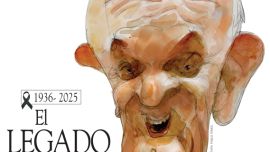Buenos Aires Province Governor Axel Kicillof yesterday finally surmounted a week of fierce resistance to his proposals to update provincial taxation to last year’s inflation rate, following an intense two-hour meeting with opposition mayors.
Following the denial of quorum to debate his bill in the last days of 2019, Kicillof has finally been assured a legislative session next Wednesday to vote on the tax reform.
The new governor scored a further point when he gained assent for debate to begin in the provincial lower house (where his Frente de Todos holds a majority) and not in the provincial Senate, which is controlled by the opposition and which had previously denied him quorum, thus lowering the risk of his reform being nipped in the bud.
Kicillof is a man in a hurry with his tax reform because there is minimal time between January 8 (when the debate is due to commence) and January 21 when a debt payment of US$500 million falls due. That sum exceeds the money in provincial coffers left him by his predecessor María Eugenia Vidal (25 billion pesos or US$418 million, according to Kicillof, although the figure is disputed), the governor argues, when he will also need 40 billion pesos to pay monthly salaries and meet other obligations. Hence the urgency of sharply higher revenues.
No sooner had Argentina changed government last month than alarm bells started ringing among creditors that January 21 could be a D-day with the “D” standing for default in Buenos Aires Province. In the early days of the Alberto Fernández presidency unconfirmed reports circulated that Kicillof had sought to nationalise provincial debt (or at least the January 21 payment) without any success.
REFORM DETAILS
The reform basically consists of raising the tax base rather than percentages (via updatingproperty assessment to inflation and its real values) but this was more than enough to provoke the wrath of propertyowners, especially in the countryside, with some standing to see their tax bills rise by up to 75 percent. Since export duties are set to rise at national level, Kicillof was contributing to killing the geese laying the golden eggs (namely agricultural exporters), some opposition politicians argued.
Tensions only rose when in an interview late last year Kicillof urged the opposition to “stop messing around because people are badly-off,” calling on his rivals to “sit down and help.”
But in the past week Kicillof has succeeded in bypassing this opposition by approaching Cambiemos mayors, who confront the provincial government at their peril if they seek smooth funding (a fact equally true of Peronist mayors under Vidal).
The former economy minister yesterday appealed to them to back his tax drive “in order to change the history of the Province.” Via his negotiations with these mayors, he has managed to undercut the opposition centred in the provincial Senate and switch the start of debate to the more favourable House.
BREAKTHROUGH
The breakthrough was confirmed yesterday by lower house Speaker Federico Otermín, who said: “We are talking to the opposition caucuses. The tax bill will go to the house floor on January 8. We are appealing to the good faith of opposition deputies, the law must go through.”
But Otermín also implicitly admitted that Kicillof’s success had come at a price since certain amendments had been worked into the original text of the bill. The Speaker defended the bill as “much better than all the previous ones because it is progressive and segmented.”
He added: “Beforehand, everybody paid the same percentage. Now instead of applying the 55 percent increase in property taxation to everybody, the better-off will see their tax bills go up 75 percent while the increase for the poorest will be 15-25 percent.”
Otermín attributed last week’s failure to achieve quorum in the provincial Senate to “infighting within [the opposition coalition] Juntos por el Cambio” more than anything else.
But ultimately, he insisted, legislators had no choice but to pass the bill since “a province cannot function without a tax law.”
The Speaker sought to approach next week’s debate with an open mind, saying that the provincial government was not only prepared to hear out opposition arguments but also to incorporate any amendments which might improve the bill.
He cordially admitted: “Not
everybody in our own caucus
sees eye to eye on this issue so
we can only welcome debate.” related news





















Comments